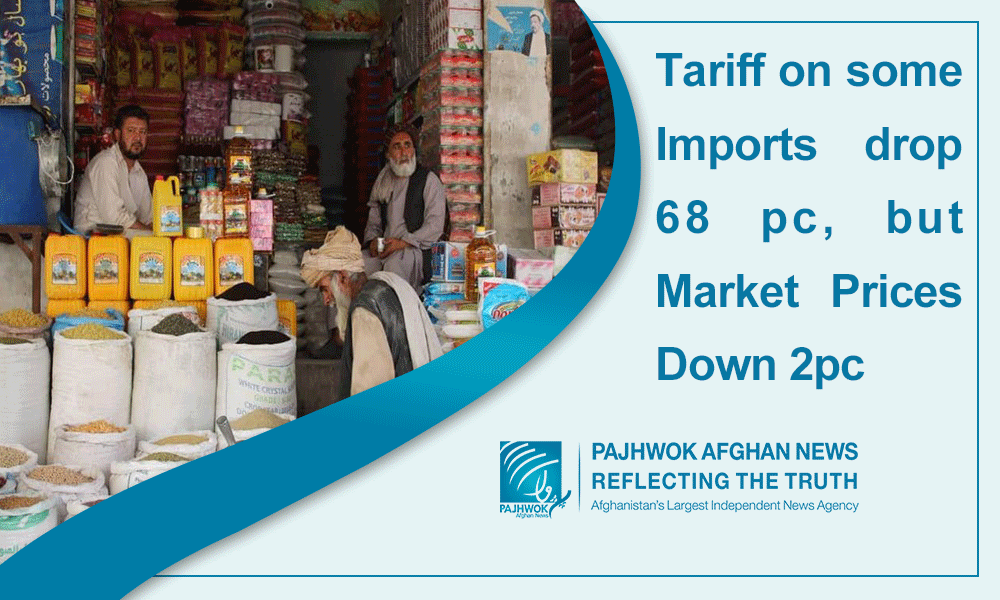KABUL (Pajhwok): Since the regime change in Afghanistan, customs duty and other expenses on the import of goods have declined by 68 percent while the Afghan currency also appreciated six percent but the market prices of goods did not significantly decrease.
The Taliban took over Kabul on August 15 and currently ruling all the country.
For a short period of time, export and import of goods and services stopped, majority of government and private institutions closed, banks and Sara-e-Shahzada also closed which led to the appreciation of dollar and surge in the prices of daily commodities.
From the past few days, Sara-e-Shahzada, the biggest money exchange market in the country, reopened, banks resumed operation and things returned to normalcy.
Pajhwok conducted an investigation and analyzed reasons behind the surge in the prices before and after the Taliban takeover of Afghanistan.
It is worth mentioning that on August 15 one dollar was accounted for 90 afs while on August 14 the greenback was exchanged for 78 afs. Later dollar further appreciated and one dollar was exchanged for 96 afs, but on September 12 one dollar was accounted for 84.30 afs.
Petroleum products
On August 14, a day before the Taliban taking control of Kabul, one litter of diesel was available for 55 afs, one litre petrol for 65 afs but today (Sunday) one litre of diesel was accounted for 52 afs, while one litre of petrol for 61 afs.
Haji NajibullahRaees, a petroleum product importer, said in the past petrol importers paid 7,000 afs to the government and 1,100 afs to the Taliban against one tonne of petroleum. In addition 20,000 afs were extorted by powerful individuals on the way from Hairatan Port to Kabul.
This shows that police and illegal armed individuals extorted 500afs from Hairatan to Kabul.
Najibullah said currently only 5,200 afs tariff was charged on one tonne of petroleum product and there were no other charges from Hairatan to Kabul.
He said there is a surge in petroleum products prices because of afghani depreciation against dollar and from another side businessmen stopped importing petroleum because they did not want to invest in existing circumstances.
Gas
One day before the Taliban takeover of Kabul, one kilogram of gas was sold for 70 afs, but today (Sunday) the price of one kilogram was the same 70afs.
An official of the Sangar Safi Gas Company, said before the Taliban regime they paid $65 to $70 tariff on one tonne of imported gas.
At that time he said the Taliban charged one tanker of imported gas — 20-22 tonnes of load — 35,000 afs and up to 8,000 afs were snatched by police and powerful individuals.
After the fall of Ashraf Ghani government, now one tonne of gas tariff is 2,800 afs and there are no other charges. He also underlined similar reason that due to uncertainty and drop in imports, the market price has not declined to the extent it should have been dropped.
He said with the resumption of banks services and other trade activities the price of gas would drop as well.
Food items
A day before the Taliban’s takeover of Kabul, a bag of 49 kilograms of Kazakhstani flour cost 2,000 Afghanis, 16 liters of Malaysian cooking oil 2,100 Afghanis, a kilogram of African black tea 360afs, a bag of 49kg of Indian sugar 2,380afs and 24kg of Pakistani rice 2,400afs.
However, 49kg of Kazakhstani flour today cost 1,850afs, a tin of 16 liters of Malaysian cooking oil 2,080afs, a kilogram of African black tea 340afs, a bag of 49kg of Indian sugar 2,550afs and 24kg of Pakistani rice 2,250afs.
A trader of food items, Najibullah told Pajhwok Afghan News that they would pay 45,000afs to 50,000afs against each truck of food items to the previous government in tax in addition to other duties. He said that they also paid 10,000afs to 12,000afs to the Taliban and around 5,000afs to police and other extorters on each truck.
He said that now they pay only 2,000afs from Kabul to Mazar-i-Sharif, or from Mazar-i-Sharif to Kabul, Mazar-i-Sharif to Faryab and there were no any extra tax on food items’ imports.
Najibullah said the US dollar jumped to 96 afghanis, commercial activities reduced and people purchased limited items since the last one month, which he added was the reason of high rates.
Evaluation
As of today, Sunday, the import tariff on fuel on average reduced to 40 percent, liquefied gas 67 percent and food items 97 percent as well as the value of US dollar also dropped by six percent.
On average, the import duty on fuel, food items and liquefied gas dropped by 68 percent while the rates of the mentioned items dropped only by two percent on average.
Rates should be controlled
An economist, Mohammad MaarufMuslimyar said that the previous government had no control on prices and the new administration also had no control on rates.
He asked officials concerned to control prices as they will not change unless there is a firm action taken on the regard.
Earlier traders imported goods on high tariff and they sold them on higher rates considering the tariff which is one of the reasons of high prices, he said.
NiamatullahBarakzai, media officer at Kabul municipality, told Pajhwok that the Chamber of Commerce and Industries was responsible for price control as municipality was only cooperating with them on the regard.
Khan Jan Alokozai, head of Commercial Chambers Federation, said that prices were controlled but banks were still not fully functional which he said was the reason of high rates.
Afghan traders have purchased food items in neighboring countries, but money transfer is suspended since the last one month and they were unable to transfer money to import the goods, he said.
He added that the prices would fall once the situation returned to normal.
This report has been produced by Pajhwok and financially supported by UNDP and Denmark.
Nh/mds/ma
Views: 248









GET IN TOUCH
NEWSLETTER
SUGGEST A STORY
PAJHWOK MOBILE APP